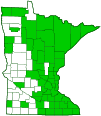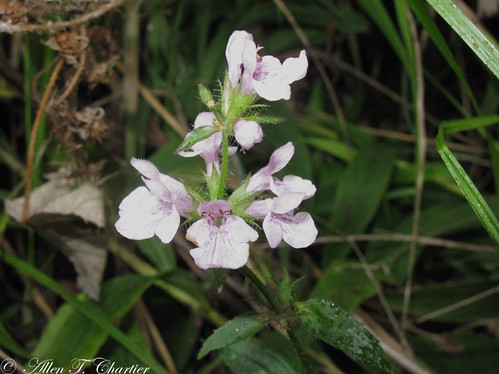hispid hedge nettle
(Stachys hispida)
Conservation • Wetland • Description • Habitat • Ecology • Use • Distribution • Taxonomy
Conservation Status |
|
|||||||
| IUCN Red List | not listed |
|||||||
| NatureServe | N3N5 - Vulnerable to Secure SNR - Unranked |
|||||||
| Minnesota | not listed |
|||||||
Wetland Indicator Status |
||||||||
| Great Plains | FACW - Facultative wetland |
|||||||
| Midwest | FACW - Facultative wetland |
|||||||
| Northcentral & Northeast | FACW - Facultative wetland |
|||||||
Description |
||
Hispid hedge nettle is a 20″ to 40″ tall, erect, perennial forb that rises from a rhizome. It often forms colonies. The stems are erect, square, hollow, and usually unbranched. They have scattered, downward-pointing hairs on the ridges of the stem but no hairs between the ridges. The leaves are opposite, thin, oblong or lance-shaped, 1½″ to 4¾″ long, and ⅜″ to 1½″ wide. They are stalkless or on leaf stalks no more than ⅜″ long. The leaf blades taper to a point at the tip with concave sides along the tip. They are blunt or rounded at the base with the sides coming together at an angle much greater than 90°. The upper surface is distinctly hairy and rough to the touch. The margins have rounded, forward-pointing teeth. The inflorescence is a 2″ to 8″ long spike of flower clusters at the end of the stem. Each cluster usually has 6 flowers and is subtended by a small, leaf-like bract. Each pair of opposite flower clusters together form a false whorl. The bracts have a fringe of long hairs on the margin. The flowers are ⅜″ to ⅔″ long. They have 5 green, hairy sepals that are fused at the base into a calyx tube 3 ⁄32″ to 3 ⁄16″ long and separated at the end into 5 triangular lobes. The calyx lobes are at least ¾ as long as the calyx tube and are hairy or have a fringe of hairs along the margin. There are 5 petals that are fused at the base into a corolla tube about ¼″ long. The petals are pink to white and often have darker pink or reddish splotches near the throat. The calyx tube is always at least ⅔ as long as the corolla tube. The corolla is divided at the end into 2 lips. The upper lip is about 3 ⁄16″ long and ⅛″ wide, hood-like, hairy outside, hairless inside. The lower lip is divided at the tip into 3 lobes, a large central lobe and 2 smaller lateral lobes. There are 4 stamens protected beneath the hood. The fruit is 4 greenish-white, 3-ribbed, 1-seeded nutlets. They turn black when they ripen. |
||
Height |
||
20″ to 40″ |
||
Flower Color |
||
Pink to white |
||
Similar Species |
||
American germander (Teucrium canadense) flowers have a greatly reduced upper lip. Marsh hedge nettle (Stachys palustris) stems have copious hairs both on the ridges of the stem and between the ridges. The petals are pink or lavender with white spots. Smooth hedge nettle (Stachys tenuifolia) main leaves are on stalks 5 ⁄16″ to 1″ long. The upper and lower surfaces may have hairs along the lower midrib but are otherwise hairless. Woundwort (Stachys pilosa var. arenicola) stems have copious hairs both on the ridges of the stem and between the ridges. The petals are pink or lavender with white spots. |
||
Habitat |
||
Wet |
||
Ecology |
||
Flowering |
||
July to August |
||
Pests and Diseases |
||
|
||
Use |
||
|
||
Distribution |
||||
|
Sources |
|||
| 5/10/2023 | ||||
Nativity |
||||
Native |
||||
Occurrence |
||||
|
||||
Taxonomy |
|||
| Kingdom | Plantae (Plants) | ||
| Subkingdom | Pteridobiotina | ||
| Phylum | Tracheophyta (Vascular Plants) | ||
| Class | Magnoliopsida (Dicots) | ||
Order |
Lamiales (Mints, Plantains, Olives, and Allies) | ||
Family |
Lamiaceae (Mint) | ||
| Subfamily | Lamioideae | ||
| Tribe | Stachydeae | ||
| Genus | Stachys (hedgenettles) | ||
There is considerable disagreement about the number, the classification, and the common names of Minnesota’s Stachys species and varieties. |
|||
Synonyms |
|||
Stachys palustris var. hispida Stachys tenuifolia var. hispida Stachys tenuifolia var. perlonga |
|||
Common Names |
|||
hairy hedge nettle hispid hedge nettle marsh hedge nettle |
|||
The common name “hairy hedge nettle” is widely used for both Stachys hispida and for Stachys pilosa var. pilosa. |
|||
Visitor Photos |
|||||
Share your photo of this plant. |
|||||
| This button not working for you? Simply email us at info@MinnesotaSeasons.com. Attach one or more photos and, if you like, a caption. |
|||||
|
|||||
MinnesotaSeasons.com Photos |
|||||
|
|||||

Visitor Videos |
|||
Share your video of this plant. |
|||
| This button not working for you? Simply email us at info@MinnesotaSeasons.com. Attach a video, a YouTube link, or a cloud storage link. |
|||
Other Videos |
|||

Visitor Sightings |
|||||
Report a sighting of this plant. |
|||||
| This button not working for you? Simply email us at info@MinnesotaSeasons.com. Be sure to include a location. |
|||||
|
|||||
MinnesotaSeasons.com Sightings |
|||||
|
|||||

|
Created: Last Updated: © MinnesotaSeasons.com. All rights reserved. |


